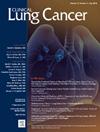EXcellenT 试验:积极治疗中的扩展癌基因上瘾肺癌患者的运动疗法
IF 3.3
3区 医学
Q2 ONCOLOGY
引用次数: 0
摘要
导言:非小细胞肺癌(NSCLC)的生长和恶化是由致癌基因突变引起的,这一发现促进了一系列分子靶向疗法的开发。与传统化疗相比,酪氨酸激酶抑制剂(TKIs)可改善肿瘤基因上瘾的非小细胞肺癌患者的总体预后,确保患者更好地接受治疗,且副作用较小。然而,对于那些通常存活时间较长并渴望恢复生活质量的患者群体来说,治疗仍然完全 "以药物为中心"。尽管有大量文献论述了辅助治疗和生活方式推广的重要性,但关于体育锻炼的指南却很笼统,通常是针对整个肺癌病理的。方法和目标EXcellenT是一项意大利单中心随机前瞻性研究,共招募了40名确诊为使用TKIs积极治疗的抗癌基因成瘾晚期NSCLC患者。患者将按 1:1 的比例随机分配到 "介入 "组或 "对照 "组。在干预组(A 组)中,参与者将接受为期 3 个月的多组分个性化体育锻炼处方,其中包括在培训中心进行的监督指导计划和在患者家中进行的基于应用程序的体育锻炼计划。在对照组(B 组)中,患者将每月接受一次由健身专业人士指导的课程,从而在无人监督的情况下在家接受体育锻炼咨询。将对血液代谢组和免疫表型进行前瞻性收集,以研究导致患者疾病的基因改变的整合情况。该项目的总体目标是评估量身定制的体育计划是否会对这一特殊同质亚组患者的生活质量和表现产生重大影响。探索性目标是阐明代谢物、免疫参数和基因失调之间的潜在联系,以及体育锻炼如何影响这种相互作用。该癌症患者群体的同质性将有助于深入了解在使用 TKIs 治疗期间,运动对新陈代谢和免疫力的影响。本文章由计算机程序翻译,如有差异,请以英文原文为准。
The EXcellenT Trial: Exercise in Extended Oncogene Addicted Lung Cancer in Active Treatment
Introduction
The discovery of oncogenic mutations that drive the growth and progression of Non–small-cell lung cancer (NSCLC) led to the development of a range of molecular targeted therapies. Tyrosine kinase inhibitors (TKIs) improve the overall outcome of patients with oncogene addicted NSCLC, ensure a better compliance to treatment and few side effects compared to traditional chemotherapy. However, the treatment is still completely “drug-centric”, in a population of patients who usually survive for a long time and desire to regain their quality of life. Despite an extensive literature on the importance of complementary treatments and lifestyle promotion, the guidelines on physical exercise are general and usually refer to the entire lung cancer pathology.
Methods and objectives
EXcellenT is an Italian monocentric randomized prospective study enrolling 40 patients diagnosed with oncogene-addicted advanced NSCLC in active treatment with TKIs. Patients will be randomized (1:1 ratio) to an ‘interventional’ or a ‘control’ group. In the interventional arm (arm A), participants will receive a 3-month multicomponent personalized physical activity prescription combining a supervised coaching program at the training center and an app-based physical activity schedule at patients home. In the control group (arm B) patients will receive a fitness professional-guided montly session that will result in an unsupervised home-based physical activity counselling. Prospective collection of blood metabolome and immune phenotypes will be performed to investigate the integration with genetic alterations that drive the patient's disease. The overall aim of the project is to evaluate if a tailored physical program may have a significant impact on quality of life and performances of this specific homogeneous subgroup of patients. The exploratory goal is to elucidate a potential link between metabolites, immune parameters and genetic deregulations and how this interplay may be influenced by physical exercise.
Conclusion
EXcellent trial aims to propose a new approach to personalized medicine in the specific subgroup of oncogene-addicted NSCLC patients, where targeted therapy is integrated with an equally tailored physical activity program. The homogeneity of this cancer population will provide insights on the influence of exercise on metabolism and immunity during treatment with TKIs.
求助全文
通过发布文献求助,成功后即可免费获取论文全文。
去求助
来源期刊

Clinical lung cancer
医学-肿瘤学
CiteScore
7.00
自引率
2.80%
发文量
159
审稿时长
24 days
期刊介绍:
Clinical Lung Cancer is a peer-reviewed bimonthly journal that publishes original articles describing various aspects of clinical and translational research of lung cancer. Clinical Lung Cancer is devoted to articles on detection, diagnosis, prevention, and treatment of lung cancer. The main emphasis is on recent scientific developments in all areas related to lung cancer. Specific areas of interest include clinical research and mechanistic approaches; drug sensitivity and resistance; gene and antisense therapy; pathology, markers, and prognostic indicators; chemoprevention strategies; multimodality therapy; and integration of various approaches.
 求助内容:
求助内容: 应助结果提醒方式:
应助结果提醒方式:


